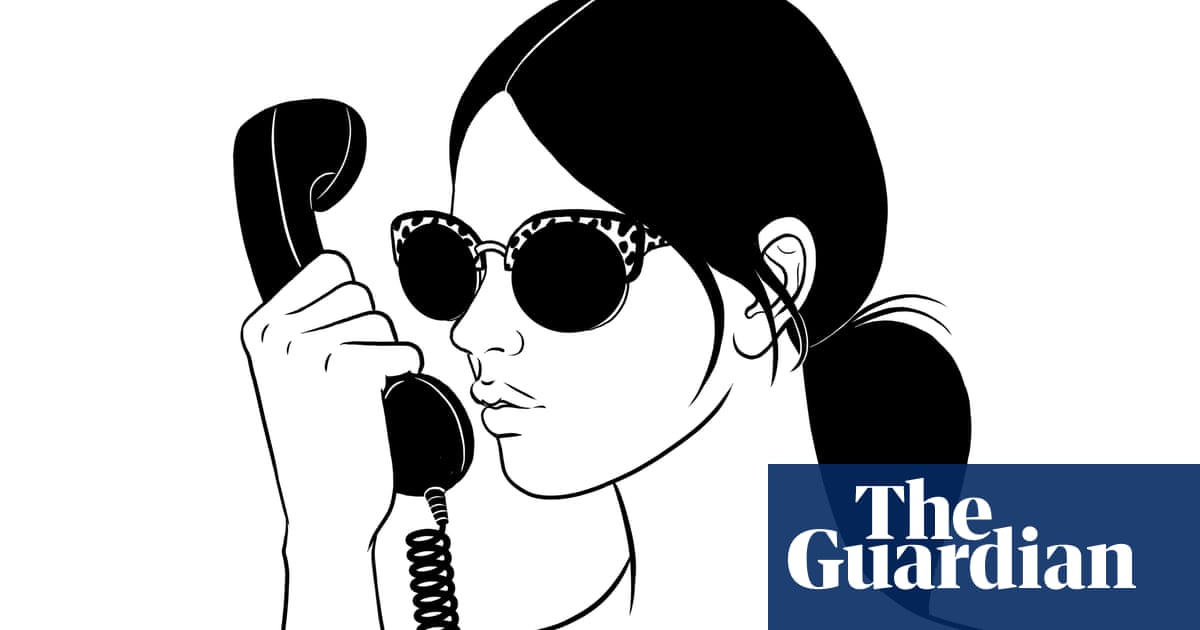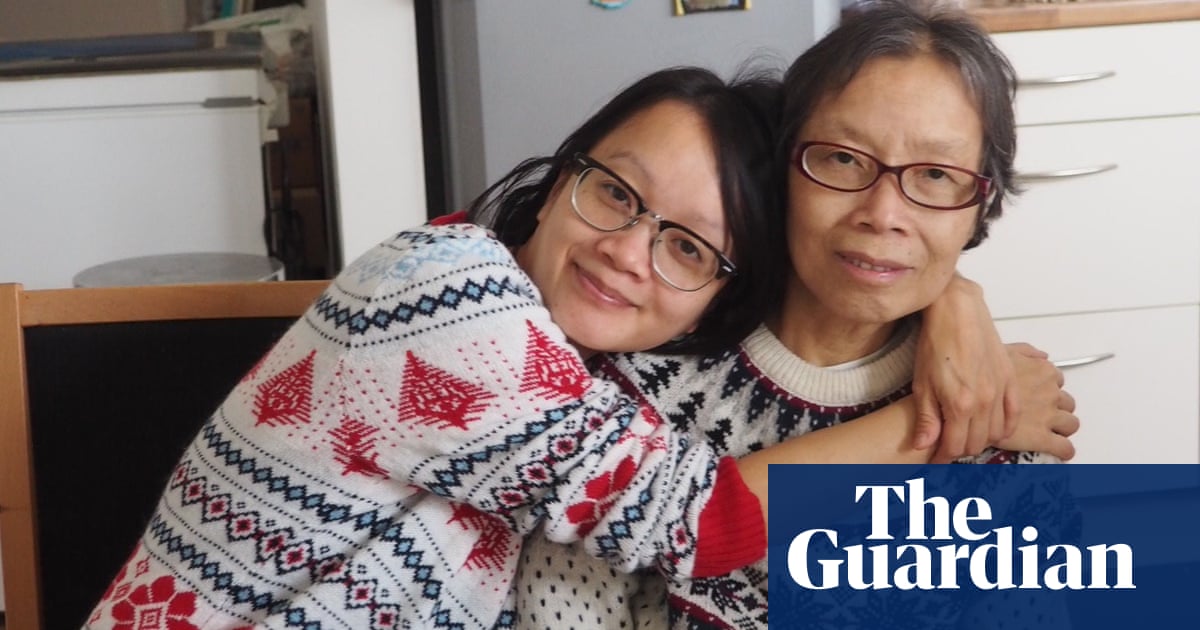
was on the phone to a friend recently, blathering away as usual, when I realised that there was no one on the other end of the line. How long ago had this happened? I checked my phone and discovered, to my horror, that the call had ended almost five minutes ago.
In the pub with another friend, not long after this incident, I asked how self-obsessed she thinks I am – a question only self-obsessed people ask, along with our other hobbies: stalking ourselves on social media and planning our own funerals. Without deliberation, she concluded that I was an 8.5 out of 10. “OK…” I reeled, deeply offended. “But I ask about you too, right? I am a good friend?” Quickly, the subject was changed.
That night, I lay in bed, thinking only of myself, and did an audit of my life. Yes, I recently gave up on therapy because I’m so happy to talk to anyone I know about my feelings that it seemed a waste of money. But I get deeply irritated by those people who sit next to you on a flight and ask where you are going just so that they can give you a monologue about themselves for an hour. How could I talk about myself too much when I find others who do so annoying? I feel certain that, were I forced, I could go at least a week without talking about myself.
At 28, I lie squarely within what Time magazine called the “me me me generation”, after collecting data that showed millennials are more narcissistic, entitled and fame-obsessed than any other cohort of society. I feel this acutely as a writer who is often paid to write about myself for a living. My most successful contemporaries are the millennial female journalists who have, with a bit of clever personal self-branding, modelled themselves into semi-influencers: Dolly Alderton, Jia Tolentino, Cat Marnell. “I owe a lot of my career to the fact that my temperament, my self, and my life all map well and easily on to the persona-based internet,” Tolentino recently told the Guardian.
But it’s not just my generation that is more self-obsessed. Using magnetic resonance imaging of the brain, researchers at the Harvard University Social Cognitive and Affective Neuroscience Lab have found that talking and thinking about ourselves is accompanied by high levels of activity in the areas of our brain associated with motivation and reward.
Social media has made us less attuned to what is going on around us, too. The average internet user spends two hours 24 minutes on social media daily; and receiving “likes” for content we post about ourselves is associated with increased dopamine, the neurotransmitter that makes us feel good.
According to Kate Murphy, who has spoken to hairdressers, CIA agents and priests who take confession for her book You’re Not Listening: What You’re Missing And Why It Matters, we are not totally to blame: our modern age encourages self-involvement and, particularly, the prioritisation of talking over listening. We’ve all been guilty of waiting for an opening in the conversation just so we can have our turn to speak, but Murphy argues that, recently, things have got out of hand.
In schools, debate, rhetoric and presenting are all taught, but not listening. At work, we are told to be leaders or “girl bosses”, while those who make it in their professions invariably end up giving a Ted Talk. At home, we bark orders at Siri and Alexa, at the same time filtering out different viewpoints on social media, leaving us in an echo chamber.
“I guess I’ve noticed the same things you mention about yourself,” Murphy says in a soft Texan accent, when I call to ask why she wrote the book. “We feel the need to advance our own agenda to sell ourselves, we’re distracted by technology and we’re consumed by what’s going on in our own heads.”
Murphy quotes the famous book written in 1936 by Dale Carnegie, How To Win Friends And Influence People. “You can make more friends in two months by becoming interested in other people than you can in two years by trying to get other people interested in you.”
After my friend’s character assassination in the pub, I wondered later that night what I would gain from talking about myself less, and resolved to do the unthinkable: avoid any mention of myself in conversation. (I did this experiment long before social distancing guidelines were in place, although it would have been a lot easier if I’d had the “mute mic” button I have in isolation.)
It is a Monday evening and I am at a dinner party, fidgeting in my seat but holding my tongue. I have decided that for my first attempt at not talking about myself, this event will be perfect. I don’t know most of the people here: fewer friends means fewer people likely to notice that I am being unusually generous in the conversation.
When I arrive, I pour myself a glass of wine and start throwing questions out into the room. A Greenpeace activist tells me about their planned expedition in the Antarctic. A comedian tells a very entertaining story about a recent gig where she was trapped on a lesbian cruise ship for a week. So far, so normal. Suddenly, an hour has passed and I find that because I am not talking, but listening, I have much more time and headspace to think of funny quips to respond to other people’s anecdotes. I am hilarious. Funnier than the comedian.
After two hours, the conversation does eventually turn to me. I am offended that it took so long, but I do not let on. Someone tells me that they read my book Queer Intentions, which is part memoir (quelle surprise!) and part reportage, exploring LGBTQ+ rights across the west. They ask about the research process and I deflect the question by talking about the people in it: “Everyone I interviewed was absolutely incredible. So fascinating, so honest.” But it comes across feigned, like a Miss World acceptance speech.
I leave the room before I can be probed further, excusing myself to help the host wash up in the kitchen. Over the pans, he asks me how I’ve been doing. I can’t resist. I explode with my recent gossip like a dam bursting. Out of the floodgates pours an entire monologue about a holiday romance, segueing seamlessly into a rant about searching for a flat. The washing-up is finished long before I am. I couldn’t last one evening. I may have a problem.
Seeking answers, I contact Dr Craig Malkin online. He is a Harvard psychologist who has written two books on narcissism, one of them so popular that it ended up in Oprah’s book club. Narcissism, he tells me, is on a spectrum. Everyone has some narcissistic traits, he says, but a narcissist is someone who lets it govern their personality. When it tips over into a problem, he says, is when you have narcissistic personality disorder (NPD). These people exhibit what Malkin calls the triple E: they are so driven to feel special that they will exploit other people; they are so entitled they think other people should bend to their will; and empathy impairment can make them blind to the feelings of others, usually to the detriment of personal relationships.
Being a narcissist is different from being self-obsessed, says Malkin, because you could be self-obsessed for any number of reasons, short- or long-term – from having obsessive compulsive disorder or anxiety, to being really stressed about preparing for your wedding. Narcissists inherently think they deserve more attention and are always comparing themselves with others. We can spot one, Malkin says, when it feels like “getting ahead comes over getting along”.
That doesn’t seem like who I am – I just really like the sound of my own voice – and yet I feel a strange pang of sympathy for narcissists. “I have been looking at the reviews of your book and notice that one calls it ‘terrifying’, and that the Oprah book club review said it would help you to ‘protect yourself against narcissists’,” I tell Malkin. “Do we think narcissists are getting a bad rap?” Potentially, he says, explaining that we are more prone to NPD if our parents are narcissistic, or if we do not experience loving parenting with set boundaries. Plus, in extroverted NPD – present in a certain type of more outgoing, disordered narcissist – men are twice as likely to be diagnosed as women, probably because “women are discouraged from, and punished for, being too loud, outgoing or attention-seeking, and men are rewarded for it”.
So, narcissism is both innate and conditioned, he says; thus it’s not really your fault if you are one. Besides, “There are many narcissists whom you can invite into a loving, secure relationship and they have some flexibility, and if you teach people with NPD how to relate to people when they are feeling scared, vulnerable or sad, the narcissism drops.” That is why Malkin is able to help people with NPD: once identified, it is to some extent treatable. Overall, he says, “It’s not bad to be a narcissist… not as a value judgment.”
By Wednesday, I have become much more focused on my task. I meet a close friend for lunch and, with therapist levels of Zen, I offer him the floor, enjoy my food and listen. Within 20 minutes, he tells me about problems with his partner that have been going on for a year – something he had never mentioned before, partly, he admits, because he isn’t very good at talking about his feelings, but also because I never gave him the space. After work, I go for a drink-slash-meeting with a colleague – in which, admittedly, I talk about myself because it’s a meeting about my work – but I do make an effort to talk about myself less. And so she begins to tell me about her love life. Over the course of two drinks, I feel we progress from colleagues to something closer to real friends. Create more silence, I notice, and people will start to fill it.
In the world of dating I have never been particularly mysterious or aloof. You could describe my seduction technique as “highly available”; glance at my text flirtations and you would be alarmed to see that I send three times as many messages as the person I am trying to hit on. At least, that is, until I recently met my match: a girl who is as self-obsessed as I am sends me long, unsolicited streams of consciousness at 3am that resemble dream diary entries (and perhaps not incidentally she is – like me – a Gemini).
We go to dinner and, as I expect, she is happy to talk enough for both of us. She tells me her college coming-out story, the long version. I listen intently, although I notice that I occasionally feel compelled to interrupt – not to talk about myself, but to ask more questions, spur things on, break up the story a bit. I wonder whether this counts as bad listening or good listening, rude or engaged.
After a while, I start to drift into thinking about a delivery that hasn’t arrived, my next meal, another date I went on with someone else, but catch myself and take note of my poor attention span. My wandering mind leads me to accidentally put my sleeve in my dinner, and I am frustrated that I can’t use a dazzling anecdote to redeem myself.
At the end of the date she says, “I feel like I’ve talked this whole time. What about you?” We can talk about me next time, I say, feeling smug and mysterious for maybe the first time ever.
I call Murphy and tell her I’ve been struggling to be a present listener. Thankfully, she assuages my guilt. “Because we’re social animals, we want to be liked,” she says. “So a lot of the time, people are spinning the wheel, thinking about what witty, wonderful or intellectual thing they want to say next. But, as a result, you miss half of the conversation. It often happens with people who are smarter.”
Is that true, I ask, hoping I’m simply too intelligent to be attentive. “It is. When you have a higher IQ, it makes it harder to listen because your brain can think of more things to think about and you’re more likely to assume that you already know what people are going to say. Plus smarter people tend to be more neurotic and anxious. So things can more easily hijack their attention.”
Over the weekend, I grow tired of my new, less self-involved lifestyle. OK, I’ve shut up about myself only half of the time anyway, but when I meet friends at a bar and contribute little to the conversation, I only feel half present. Here’s the thing: talking, but not talking about yourself at all, is both inconvenient and weird; generally, people expect a two-way exchange of personal information. We give over something of ourselves as a courtesy and, in return, others open up to us. It might have endeared my date to me (she texts to tell me she wants to see me again), but if I shared nothing of myself, how do I know she really likes me?
Still, I realised that my lack of listening and habit of hitting people with an onslaught of information have a lot to do with the economy of time. For me, socialising often becomes a conveyor belt of cursory “catch-up” dinners with people you see once every three months, involving a manic exchange of top-line news. What is much more enjoyable, I learn in my meagre six days of relative selflessness, is to give yourself and others more of your time, to lie back and listen.
I failed my challenge of not talking about myself for a whole week. But a lot like dry January (which, yes, I also failed), it did curb my bad habits. A week or so on, I am more of what Murphy would call an “active” listener, so, naturally, I decide to meet up with the friend who rated me 8.5 out of 10 on the self-obsessed scale, in order to try to lower my rating. Without me speaking, the time we spend together feels forced and there are lulls in the conversation. Eventually the friend cracks. “Haven’t you got any good stories?” she asks. Oh, I thought I talked about myself too much, I reply. “Of course you do, but that’s your special quality,” she says. “You are completely comfortable holding the floor for one hour, but at least it’s entertaining.”
You don’t have to have a drinking problem to find dry January difficult. Similarly, I realise, you don’t have to be a raging narcissist to be unable to shut up about yourself. There is nothing wrong with a bit of self-obsession, but now I occasionally pause for breath – to make sure everyone else has had their conversational turn… or to check whether the line has gone dead.












